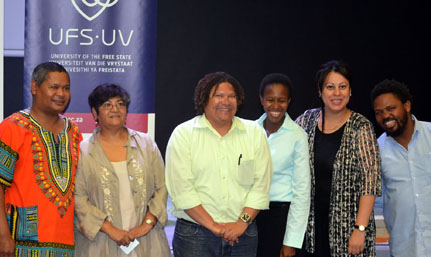Latest News Archive
Please select Category, Year, and then Month to display items
14 June 2024
|
Story Anthony Mthembu
|
Photo Suplied
 Jeremiah Hlahla, a UFS student completing his PhD in Botany at the University of Debrecen as part of an exchange initiative funded by the Erasmus+ Mobility Programme.
Jeremiah Hlahla, a UFS student completing his PhD in Botany at the University of Debrecen as part of an exchange initiative funded by the Erasmus+ Mobility Programme.
As part of an exchange initiative facilitated by the Erasmus+ Mobility Programme, Jeremiah Hlahla, a student at the University of the Free State (UFS), is nearing the completion of his PhD studies at the University of Debrecen in Hungary. Hlahla’s journey, which began in February 2024 and is set to conclude in July 2024, has been a remarkable learning opportunity. “As a first time-traveller to Europe, I have thoroughly enjoyed engaging with people from different countries and cultures,” he said.
The benefits of international collaboration
Hlahla is currently pursuing a PhD in Botany, focusing on plant stress physiology. “My current PhD project investigates the physiological, biochemical and morphological responses of vegetable-type soybean, or edamame, to combined drought and heat stress,’’ he explained. He considers the University of Debrecen the ideal institution to complete his research due to its extensive expertise and resources in similar projects. He noted that his colleagues at Debrecen conduct significant work on plant protection against biotic and abiotic stresses, including salt and drought stress, as well as proteins and amino acids in barley and other legumes.
Given the vast knowledge available on similar projects, Hlahla has found substantial engagement with his work at the University of Debrecen. “Upon arrival, I delivered an introductory lecture presenting my UFS project on the synergistic effects of combined drought and heat stress on the physiology and biochemistry of edamame. It was an engaging session as everyone could relate to my work and asked many questions,’’ he said.
Insights gained from the exchange
Hlahla has also gained valuable lessons that will assist him in his research career, including biotechnology and physiology tools. “I learned how to prepare samples and use high-performance liquid chromatography (HPLC) and reversed-phase ultra-high-performance liquid chromatography (UHPLC) to quantify proteins and amino acids,’’ he said. These techniques are beneficial not only for his current work but will also support future soybean research.
As his experience at the University of Debrecen nears its end, Hlahla reflects on the collaborations and friendships he has formed, which stand out as a significant highlight.
Institute hosts National Action Plan Discussions
2013-03-12
|

|
Attending the discussions were from left: Prof Andre Keet, Ms Yasmin Sooka, Dr Willy Nel, Ms Gugu Ncongwana, Director: Department of Justice and Constitutional Development, Ms Danaline Franzman, Chief Director: Social Justice and Participatory Democracy in the Department of Justice and Constitutional Development and Andile Mngxitama, columnist and political commentator.
Photo: Sibusiso Tshabalala
12 March 2013 |
The Institute for Reconciliation and Social Justice, together with the Department of Justice and Constitutional Development and the Foundation for Human Rights, hosted a workshop-style discussion with university and community role players on the National Action Plan (NAP) to Combat Racism, Xenophobia and related intolerances. As an obligation under the United Nations Declaration at the World Conference on Racism, Xenophobia and related intolerances held in Durban, 2001, the NAP was presented by Yasmin Sooka (Executive Director of the Foundation for Human Rights). Dr Willy Nel, from the Faculty of Education, was the respondent and Prof Andre Keet, Director of the Institute, facilitated the workshop.